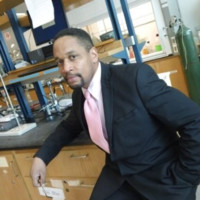
Robert D. Craig
- Courses4
- Reviews5
- School: Wagner College
- Campus:
- Department: Chemistry
- Email address: Join to see
- Phone: Join to see
-
Location:
1 Campus Rd
Staten Island, NY - 10301 - Dates at Wagner College: November 2014 - October 2017
- Office Hours: Join to see
Biography
Wagner College - Chemistry
Organic Chemistry Instructor at Queens College of The City University of New York
Higher Education
Dr Robert
Craig PhD
Brooklyn, New York
Hello this is Dr Craig !!
At present, I am teaching organic chemistry lecture and lab (Wade 8th ed) to about 35-to 40 students, lecture and lab at Wagner College. These students all take part in the WAGNER College PA program. I work for Dr. Nick Richardson who was kind enough to reappointment me. I instruct a course in conjunction with Dr. Chamdima Abeywickrama (formally of St Steven’s Institute of Technology Hoboken, New Jersey) and Dr. Qi Li –who is the College CLT
Experience
Wagner College
Wagner College
211, 212 Organic Chemistry I, II.
Three hours of lecture and three hours of laboratory weekly in each course. A presentation of the fundamental principles of organic chemistry in which the mechanisms of organic reactions are stressed. The nomenclature, structure, synthesis, reactions, and properties of the principal classes of organic compounds are described. The fundamental principles of qualitative organic analysis are presented. Prerequisites: Chemistry 111, 112. Chemistry 211 offered fall semester, 212 offered spring semesterWagner College
Organic Chemistry Instructor Lecture and Lab
211, 212 Organic Chemistry I, II.
Three hours of lecture and three hours of laboratory weekly in each course. A presentation of the fundamental principles of organic chemistry in which the mechanisms of organic reactions are stressed. The nomenclature, structure, synthesis, reactions, and properties of the principal classes of organic compounds are described. The fundamental principles of qualitative organic analysis are presented. Prerequisites: Chemistry 111, 112. Chemistry 211 offered fall semester, 212 offered spring semesterWagner College
Adjunct Assistant Professor
The chemistry program offers a comprehensive background in organic, inorganic, physical, analytical and biochemistry, with the main goal of instilling the understanding and relevance of chemistry. Laboratory work serves to apply the lecture material and provide training in laboratory skills. Advanced coursework in chemistry, which can include research, serves to deepen understanding and hone laboratory and quantitative skills. Within a research project, whether on campus or through an external internship, students develop their abilities to design and execute experiments as well as analyze and present their results. Majors gain the confidence and problem-solving skills necessary to continue their education in medical, other professional schools or graduate school, or to pursue industrial careers in fields such as pharmaceuticals, forensic science, materials chemistry, biochemistry and analytical chemistry.
Queens College
Physics Instructor
Queens College, CUNY
PHS 201 Research Methods and Laboratory Instrumentation
This course is an introduction to the nature of scientific investigation and the skills needed to develop a research problem. Topics include the scientific process, research design, library and computer resources for literature review, analysis and presentation of data, use of computer for communications and data analysis, and the theory, design and operation of laboratory instrumentation.
Adelphi University
-Chemistry department
Adelphi University is a private institution that was founded in 1896. It has a total undergraduate enrollment of 5,040, its setting is suburban, and the campus size is 75 acres. It utilizes a semester-based academic calendar. Adelphi University's ranking in the 2015 edition of Best Colleges is National Universities, 149. Its tuition and fees are $32,340 (2014-15).
Bronx Community College
Research Associate -Lab instructor
Recent publications:
1. “FT-NMR of Curcumin” Magnetic Resonance in Chemistry (in press) Dr. Roberto Gil –editor Carnegie melon
2. “Cooperative learning in science education:FT-NMR of Curcumin and Mono-carboxylated Curcumin” Will appear: “Magnetic Resonance in Chemistry’ (in press) Dr. Roberto Gil –editor Carnegie melonCollege of Staten Island, City University of New York
College of Staten island
CHEM 256 - Organic Chemistry Laboratory SECOND SEMESTER
CHEM 250 - Organic Chemistry Laboratory FIRST SEMESTER
CHEM 240 - Foundations of Analytical Chemistry Advanced Laboratory: Instrumental Analysis
Semester Hours: 2
________________________________________
Topics:
Laboratory work in the application of instrumental analysis methods which may include atomic and molecular spectroscopy, fluorescence, nuclear magnetic resonance, chromatography, thermal analysis, electrophoresis, mass spectrometry and computerized data processing. (4 hours laboratory.)
Fundamentals of gravimetric, volumetric and potentiometric methods; separative techniques; statistical analysis of experimental results
Education
Graduate School and University Center, CUNY
Doctorate of Philosophy, Analytical/Physcial Chemist
Education
Concept of a Green Drug, Curcumin and it’s derivatives as a model systemThe Graduate Center, City University of New York
Masters in Education
Urban Education and Leadership
Concept of a Green Drug, Curcumin and it’s derivatives as a model systemWagner College
Wagner College
211, 212 Organic Chemistry I, II. Three hours of lecture and three hours of laboratory weekly in each course. A presentation of the fundamental principles of organic chemistry in which the mechanisms of organic reactions are stressed. The nomenclature, structure, synthesis, reactions, and properties of the principal classes of organic compounds are described. The fundamental principles of qualitative organic analysis are presented. Prerequisites: Chemistry 111, 112. Chemistry 211 offered fall semester, 212 offered spring semester
Positions
Sigma Xi
member only
Sigma Xi
member only
Sigma Xi
member only
Sigma Xi
member only
Sigma Xi
member only
Sigma Xi
member only
Possible Matching Profiles
The following profiles may or may not be the same professor:
- Robert Craig (00% Match)
Lecturer (Doctoral Schedule)
College of Staten Island - College Of Staten Island - Robert Craig (00% Match)
Adjunct Assistant Professor
College of Staten Island - College Of Staten Island Adj - Robert Craig (00% Match)
Adjunct Assistant Professor
Lehman College - Lehman College Adj - Robert Craig (00% Match)
Adjunct Assistant Professor
Queens College - Queens College (adj)



